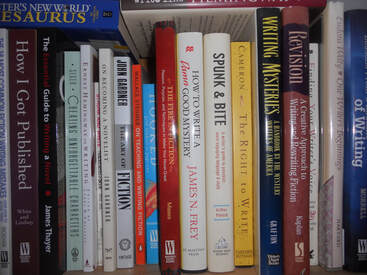 I changed the story. I’m rewriting The Biggest Cowboy In The World in response to comments by my editor. I’ve blogged before about the standards for the number of words in different books and her first comment that my manuscript was too long. I wasn’t sure that I could delete 30,000 words without making fundamental changes to the story and I now know that I was correct. My first attempt at making the novel shorter had me cutting 24,000 words, and I didn’t find that it affected the storyline too much. I am now at just over 31,000 words deleted, and I chose to change several significant aspects of my story so I could shorten it further—my lead character doesn’t become a Comanche shaman, doesn’t bring the house to life, doesn’t send a telegram to his sister, returns to the house only once, the house doesn’t talk, the house doesn’t have a secret passageway to a secret room, doesn’t have a body in that room, the magic comes not from my lead character but from his uncle, a Comanche shaman, and other things. Divorcing my new novel from the old one--Smoke Dreams—was a very good decision. Preserving the plot from the first book made the second book overly complicated, and removing it made the new story considerably cleaner, simpler, and more readable. I still have the two major characters between the two, but there are new actions that are not in the first book. However, I’m embarrassed by having written a story that had 24,000 words that weren’t needed in the first place. What in the world did those words say that wasn’t needed? That’s a fair question. When I write my next novel, I’ll just leave those words out to begin with. I found this:
For a verbally challenged guy, I am amazingly wordy in print. I guess I was just having too much fun to be leave things out. Some of the deletions of what I’ve listed are elementary and I should know better (which is true), while some of the deletions did cause the story to lose context, color, pace, and smoothness; I had to work hard afterwards to eliminate choppiness. I like to read stories that help me visual the surroundings, the characters, and the actions; I appreciate knowing the backgrounds to characters, believing that it makes them more credible and believable; I like a good pace and I like smoothness; I personally like to know the weather—it helps build the backdrop of the story; I like hearing history, but I probably get carried away. On the other hand, having a lot of unnecessary words obscures the words that are necessary. I didn’t change much with the characters, but, reading my most recent draft, I find them much easier to see, hear, follow, and identify with. My new text is much more specific in every way. I also found many mistakes and blame the clutter for not having found them before. I remembered what Ursula Le Guin said about the ability of readers to “fill in” a lot, so I looked for opportunities to remove descriptions that readers could provide on their own. As well, I discussed the manuscript with a Hollywood script writer and he encouraged me “to make every word count”. I have tried to apply that to every sentence I review and deleted many words solely based on that rule of thumb. I may have been premature in submitting my original draft to my editor. However, without her input, I would not have been provoked to make the drastic changes that I have. I wish I was more of a natural writer but it’s not going to happen and I have to rely on iterations to get me through. I’m almost done with the new draft. I’m hoping that it will finish with about 112k words, compared to my first submission of over 147k words. I estimate that I will have spent about 50 total hours on the rewrite over four weeks, going through it three or so times. I’ll send it back to my editor by the end of this week and I’ll probably hear back from her in September. If it's still too long, I’ll find some way to make it shorter.
1 Comment
Buff
8/8/2021 07:19:08 pm
I love the descriptions, history and detailed characterizations in James Mitchner and Dianna Gabaldon’s books, which are HUGE. They both have huge number of loyal fans. Think it depends what kind of reader you are trying to attract. Detailed descriptions attract a more educated, thoughtful reader.
Reply
Leave a Reply. |
AuthorDon Willerton has been a reader all his life and yearns to write words like the authors he has read. He's working hard at it and invites others to share their experiences. |

 RSS Feed
RSS Feed